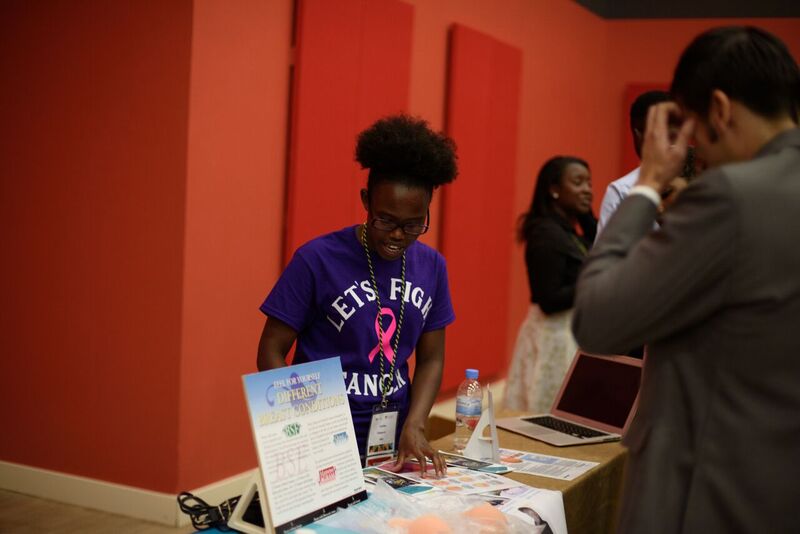Hope for Marginalized Rural Women as a Young Kenyan Team Brings Cancer Services Closer to Them
Mastercard Foundation Scholars and The Resolution Social Venture Challenge
A young Kenyan woman is leading a campaign to help raise awareness of breast and cervical cancer in her home community of Kericho, Kenya.
Together with Mercy Moi, Hycinth Cherotich, Joan Chepkoech, Willad Nahashon, Lidwin Chepngetich and Bernice Chepkemoi, Joyline, is leading a non-profit organization of a team of seven committed youth to help marginalized women get access to cancer services at an earlier stage.
Many cases of women diagnosed with breast and cervical cancer in Kenya present themselves at late stages, making it hard for them to get full treatment. In most cases, these are women from Kenya’s marginalized communities. According to the Kenyan Ministry of Health, cancer is the third leading cause of death in Kenya, after HIV and cardiovascular diseases accounting for 7 percent of annual deaths.
“A marginalized woman in Kenya is one who is probably illiterate, has no health insurance, and lives on less than Ksh100 ($1.00) per day. She is a subsistence farmer who has little food to feed her family the whole year, and has no access to clean water,” said Joyline, who in August 2017 created Mwangaza Cancer Initiative, a non-profit organization focused on raising awareness of breast and cervical cancer in Kericho County.
“I want to address cancer because of its alarming rise and because it affects almost every family in Kenya. According to the Kenyan Ministry of Health, cancer is the third leading cause of death in the country after HIV and cardiovascular diseases, accounting for seven percent of annual deaths,” she said.
According to 2018 research done in Kenya by Research 8020 Limited, about 37,000 new cases are diagnosed annually in the country, which makes up 0.26 percent of the world cases. Common among women are breast and cervical cancer.
“With the help of public educators and community health nurses, we will be reaching out to women in schools, homes, and at social gatherings. We will teach them the causes, risk factors, signs and symptoms, screening methods, and statistics, as well as treatment of breast and cervical cancer,” she said.
Mwangaza Cancer Initiative focuses on early detection, diagnosis, and timely interventions.
“Since our focus is mainly on early detection, diagnosis and timely interventions, we will use breast models to demonstrate breast self-examination, an early detection tool for breast cancer. Emphasis will also be placed on the need for Human Papilloma Virus (HPV) vaccine to prevent cervical cancer and early detection through Pap smear tests. Other teaching tools including surveys will also be used.
Joyline said her team will then collaborate with local hospitals and clinics that offer free or low-cost mammograms and Pap tests, so that women willing to be screened can be evaluated and the right medical interventions taken if cancer is detected. Every six months, Mwangaza Cancer Initiative hopes to encourage a minimum of 2,000 women to be screened.
“With adequate knowledge about cancer, accessible screening services, and treatment, women will be empowered health-wise and their dreams will not be shattered by cancer,” she said.
The project is at the preliminary stage, with the team still working on terms and conditions with potential partners.
“Our major challenge now is finding a constant source of funding. We are currently dependent on grants and donations to run our project’s activities,” said Joyline, who is a Mastercard Foundation Scholar, selected for her academic talent, social consciousness, and leadership qualities.

Mwangaza Cancer Initiative won the Resolution Social Venture Challenge in 2018, a competition that rewards compelling leadership and promising social ventures led by youth. These young leaders earned a fellowship that includes seed funding, mentorship, and access to a network of young global change-makers to pursue impactful projects in their communities. A collaboration between the Mastercard Foundation and The Resolution Project, the Resolution Social Venture Challenge provides a pathway to action for socially responsible young leaders who want to create change that matters in their communities.
“Being one of the winners of the Social Venture Challenge is an honour and I feel empowered to bring positive change in health care, particularly in the fight against cancer. With the seed funding from the Resolution fellowship, we are now able to run our project and take it to the next level. I am also grateful to my able team of six for their commitment to beating cancer,” said Joyline.
“We hope to continue with the project until we are able to establish a cancer centre in Kericho County and provide services to thousands of patients from other counties in Kenya,” said Joyline.
Joyline is sure that her dream will be achieved not only for Kericho, but also for all marginalized women in Kenya.
“It is a fulfilling experience to be able to give back to my community. Service to others has always been a golden opportunity for me to not only offer my time and skills, but also learn from the people I interact with. Making people feel loved and cared for gives me so much satisfaction and energy to serve even more. As a Mastercard Foundation Scholar, I consider it a privilege to be able to give back to my community in, the fight against cancer. There’s hope in finding an ultimate solution to this fatal disease,” concluded Joyline.
Pius Sawa is a freelance journalist based in Kenya. His stories have appeared in Reuters, Farm Radio International, and Inter Press Service.


